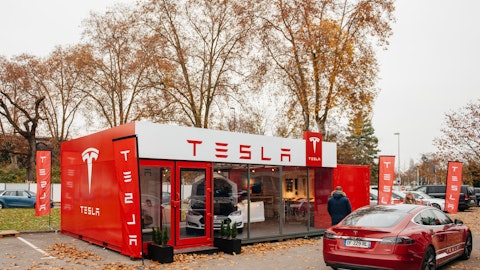Here are some things that short-sellers might get wrong or underestimate. Spiegel believes that Tesla will struggle even more with its financials, since it currently has no competition in the EV space, but with more companies having announced their own fully-electric vehicles, the competition will intensify. This is not entirely true, because like it or not, Tesla Inc (NASDAQ:TSLA) has been competing with traditional internal combustion engine vehicles, even though traditional car makers weren’t bothered by Tesla due to its small production volume. However, Tesla managed to score a lot of points on the innovation side and with its attention to detail. We should remember here that the release of the Model X was delayed because Elon Musk wanted gulf wing rear doors and he wanted them to open in a specific way. Maybe it wasn’t a good thing for the company’s financials, but this attention and the desire to make every little thing work is what will help Tesla win customers’ votes in the long run.
In this way, as Tesla Inc (NASDAQ:TSLA) has already been competing in the automotive market, it’s unlikely that a couple of new electric vehicles will change much. Moreover, if we look closer, it doesn’t look like big car companies are actually interested in electric vehicles. Volkswagen only started to make a lot of fuss about its commitment to electric vehicles after the diesel scandal emerged. According to Sierra Club, Ford Motor Company (NYSE:F) advertised its gasoline-powered Focus on cable and broadcast TV around 4,750 times, while its Focus Electric was advertised only about 200 times on national TV. Mercedes-Benz didn’t even bother to advertise its electric B-class to national TV audiences, compared to 1,400 instances of advertisement of its Mercedes C-class.
Yes, big car makers can invest much more money in research for electric vehicles and can subsidize them from sales of their traditional ICE units, but they don’t really seem to believe in electric vehicles. Or, rather, they might not be interested in the EV market evolving. Why? Because there is a whole infrastructure built around ICE vehicles and many companies make more money from services than from selling the actual car. An EV doesn’t need an oil change, doesn’t require air and fuel filter replacements, belt replacements, spark plugs, clutch, shift linkages and many many other moving parts that at some point break down in a traditional gasoline car and require replacement.
For years, car companies have even been trying to make it illegal for you to repair your own car, pushing you towards dealership-owned repair shops. As cars became more computerized, companies even attempted to invoke copyright laws to prevent people from tinkering with the on-board computers, which basically suggested that people didn’t actually own their cars. To try and make its argument more convincing, Deere & Company (NYSE:DE) last year said that if people are allowed to modify car computer systems, they could use them to download pirated music (because what’s better than a mixed CD for your girlfriend? A mixed CD for your girlfriend downloaded using your tractor).
Car companies are also not interested in electric vehicles because they don’t have the required infrastructure to support long trips. Tesla Inc (NASDAQ:TSLA) has a wide network of superchargers, which is one of the pillars of its success. Other car makers will have to figure something out in this area, although they might pull it off with smaller EVs designed for city-use only, where owners can park their cars and charge them overnight.





